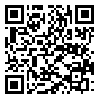1- University of Tabriz
2- Department Of Sport Science, School Of Humanities, Damghan University, Damghan, Iran. ,behzadmoohamadi@gmail.com
3- kharazmi
2- Department Of Sport Science, School Of Humanities, Damghan University, Damghan, Iran. ,
3- kharazmi
Abstract: (7069 Views)
Inclusive education refers to the placement of people with disabilities alongside their peers. Recent studies have found this method to be effective when it comes to manipulating the environment. The study investigated the effects of an inclusive education learning method applied in an extracurricular physical education to promote self-esteem and motor proficiency in a child with developmental Coordination Disorder (DCD). The research is a critical case study that involved one obese boy with DCD (age =8 years, height=127 cm and weight =33 kg) who participated in physical education activities with 14 other children without disability over a period of 9 weeks. Three tools, Cooper Smith self-esteem questionnaire, developmental coordination disorder questionnaire and Bruininks-Oseretsky-2 test and semi-structured interviews were used to collect data. Results of semi-structured interviews showed independence, belief, pleasure, family relationships, educational relationships, and social relationships improved. The Cooper Smith questionnaire also showed general (10 score), family (5 score), social (4 score), and educational self-esteem (6 score) increased. While motor proficiency increased (9 score), the body mass index decreased (1.24 score). Results emphasized the importance of applying nonlinear pedagogy in physical education by manipulating the environment and the task without direct instructions and feedback in inclusive settings.
Keywords: inclusive learning, nonlinear pedagogy, self-esteem, motor proficiency, developmental coordination disorder
Type of Study: case report |
Subject:
motor behavior
Received: 2019/11/25 | Accepted: 2020/03/9 | ePublished ahead of print: 2020/10/24
Received: 2019/11/25 | Accepted: 2020/03/9 | ePublished ahead of print: 2020/10/24
Send email to the article author
| Rights and permissions | |
 | This work is licensed under a Creative Commons Attribution-NonCommercial 4.0 International License. |



